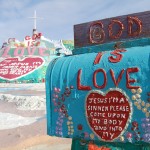Once, while I was talking with a professor in grad school, we got on the topic of how weird church is. I fully appreciate that to an outsider, gathering in a large group inside a pointy building, then standing, sitting, and kneeling periodically in unison while reciting a litany of prayers is not only bizarre but also creepy. (As a friend put it, “Imagine if aliens were looking down on us going to church. They would be so confused.”)
My professor, who was married in an Episcopalian church but didn’t really care much for any religion, went on. “And I’ve always thought our story is so silly. A guy dies, he comes back to life, and…?”
“Oh, no,” I said quickly. “I’ve always thought that story was kind of nice.”
I was surprised to hear myself. Until that moment, I hadn’t known that I thought the Resurrection story was nice.

I’m a “none.” I don’t have strong opinions about these things. My motto when it comes to theological disputes is “live and let live.” Who really cares if the communion host is a piece of bread or the actual body of Christ? I never have.
But it turns out that I like this story about a God who became a person, was killed, and rose from the dead. I think it’s a good story to form the backbone of a culture. The Resurrection is important to me as an origin tale: this is how I understand the world. God, in the form of a human, died. And then He/She/It lived again.
Easter is no Christmas, but there are a dozen little things that my family and I do to make it special. When I moved in with my now-husband, he brought home tulips and we cooked brunch. While we lived near family, we cooked together at their houses. Now that we live far away from home, my mother sends us an Easter basket. (Oops! I mean the Easter Bunny sends us an Easter basket.)
Other cultures are allowed to have their stories; I am allowed to have mine. We nones—liberal, open-minded Americans—embrace folk tales from other communities, assigning them truth as metaphors or cultural explanations. We acknowledge the importance of others’ beliefs, of the sacredness that other groups find in places we don’t, of the longevity of rituals that are carried on today though they are not fully understood. I don’t think we have to intellectually solve every problem that our own folk tales represent. True? Not true? We don’t ask that question of others’ stories. It would be rude. And besides: it’s irrelevant.
What does the Resurrection mean to me? It is a lens through which I view life. I don’t think about it consciously, at least not very often, but it informs the way I understand humans and God. We humans are inextricably linked with the divine—the divine leaps from human to divine and back again, crosses the boundaries of life and death, asks for a piece of fish to eat when it comes back to life. I can no sooner stop believing in the Resurrection than I can stop speaking with a little bit of a Jersey accent—and why would I want to do either? The Resurrection explains why I have faith in humanity and God at the same time. My little accent ties me to my homeland, where the bagels are good and chewy and the cawfee is cheap.
The Resurrection is important to me because it’s important to me. Without it, I would be a different person, and understand the world in a different way.












